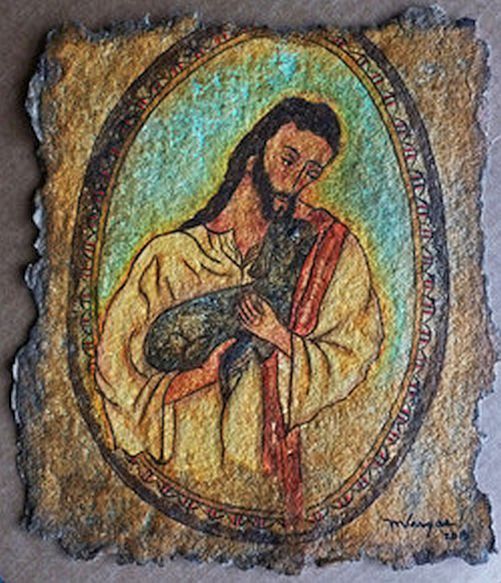

For all flesh shall receive the reward which shall be found without stain or spot, and in it the Holy Spirit shall have its home." This passage appears to make the "tabernacling" of the Holy Spirit in Jesus a reward for the purity of his life. The "flesh" is spoken of as a person who "walked as pleased God, because it was not polluted on earth." "God, therefore, took into counsel the Son and the angels in their glory, to the end that this flesh might furnish, as it were, a place of tabernacling (for the Spirit), and might not seem to have lost the reward of its service. Conybeare renders the passage: "God made His Holy Spirit, which pre-existed and created all creation, to enter and dwell in the flesh which He approved." In this text the Holy Spirit appears to be a divine substance.

"That Holy Spirit which was created first of all, God placed in a body, in which it should dwell, in a chosen body, as it pleased him." This is Martini's translation. The Shepherd speaks of a Son of God but this Son of God is distinguished from Jesus. The theology of the Church must have been very elastic at a time when such a book could enjoy popularity and implicit, if not explicit, ecclesiastical sanction, for its Christology does not seem to square with any of the Christologies of the New Testament, or with those of contemporary theologians whose occasional documents have reached us. The Shepherd of Hermas, a strange allegory written sometime in the second century, had a great vogue in orthodox circles and was even included in some copies of the New Testament (it is found in the Sinaitic Codex). Howell-Smith writes concerning the Shepherd of Hermas ( Jesus Not a Myth, pp. Work could have been composed by one person over aĪ.

On the basis of this internal analysis multipleĪuthorship seems necessary (Giet 1963), though the This last phase must have occurred before Similitude IX was written to unify theĮntire work and to threaten those who had beenĭisloyal. Vision V - Similitude VIIIĪnd Similitude X were written perhaps by the sameĪuthor to describe reprentance to Christians who were Persecution, probably under Trajan (the Clement of 8:3Ĭould be Clement of Rome). Visions I-IV were composeed during a threatened Theĭocument was composed over a longer period of time. Written in Rome and involves the Roman church. The 3d century, says Hermas was written by the brother Muratorian canon, a list of canonical books from about Of Hermas, was known to the early Church Fathers. The early Christian document Hermas, or Shepherd Snyder writes ( The Anchor Bible Dictionary, v. He told Samuel to anoint David king.Recommended Books for the Study of Early Christian Writings Information on the Shepherd of Hermas He knew that David would make a good king when King Saul had given up ruling. God had read David’s heart and knew his thoughts.

To each of the seven the old prophet had said, "the Lord has not chosen you."Įach of the seven was tall and handsome and strong, but Samuel knew that "Man looks on the outward appearance, but the Lord looks on the heart." Samuel said solemnly, "God has chosen you to be king over His people."ĭavid’s seven brothers did not look very pleased, for Samuel had looked at each of them in turn before David came. When David arrived, looking tall and handsome and brave, Jesse said, "This is my youngest son." Around Samuel were the old men of Bethlehem, listening carefully to all he said. Just inside the gate David saw his father Jesse, his seven brothers, and an old man, with long white hair and beard. When the runner came near enough, David heard him say, "Samuel, the prophet of God, has come to Bethlehem, and wants to see you." David found another shepherd to look after his sheep, and hurried off to the city gate. Presently he saw someone running towards him. One day David the Shepherd-Minstrel was out in the fields of Bethlehem, minding his sheep.


 0 kommentar(er)
0 kommentar(er)
